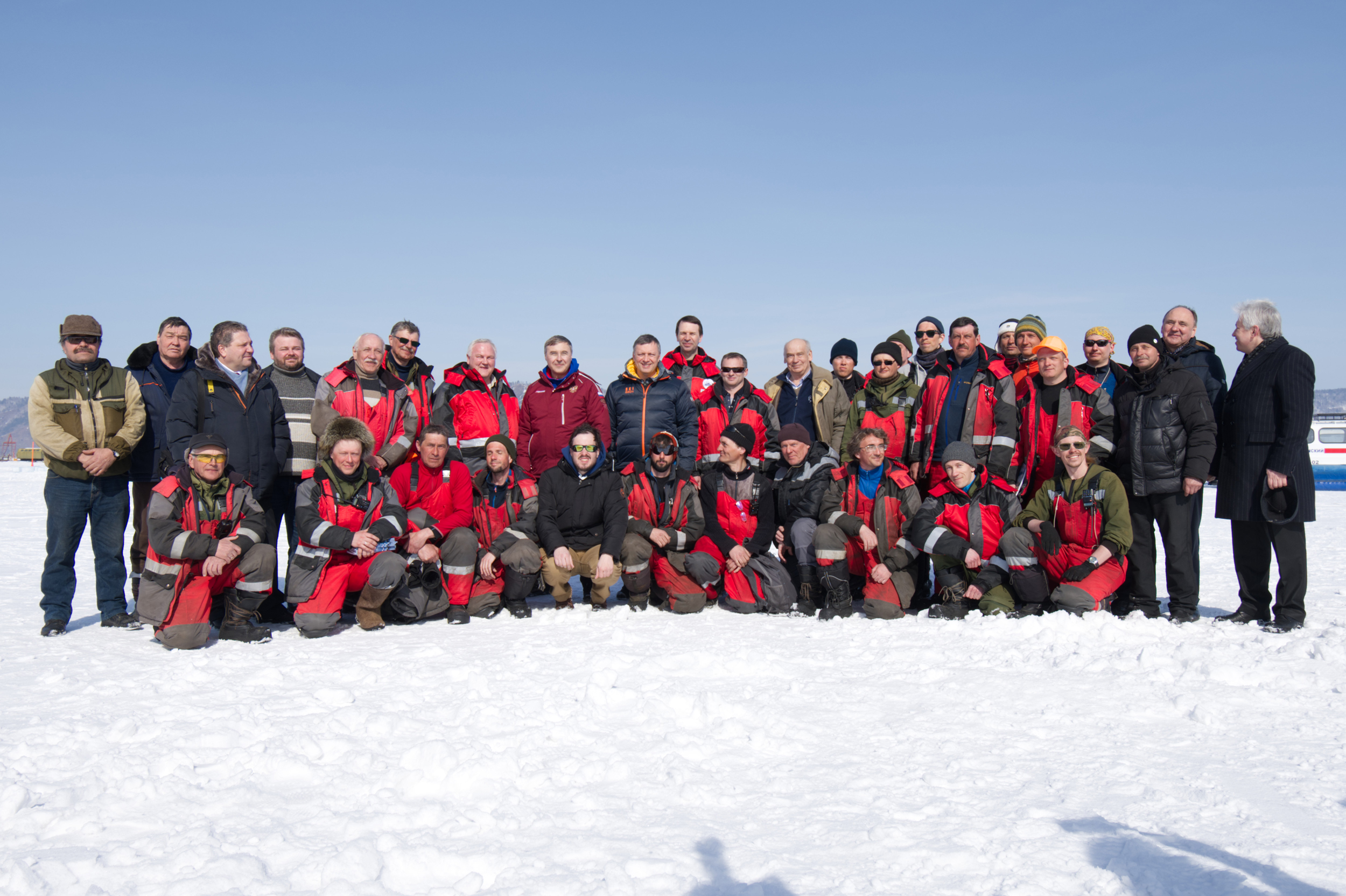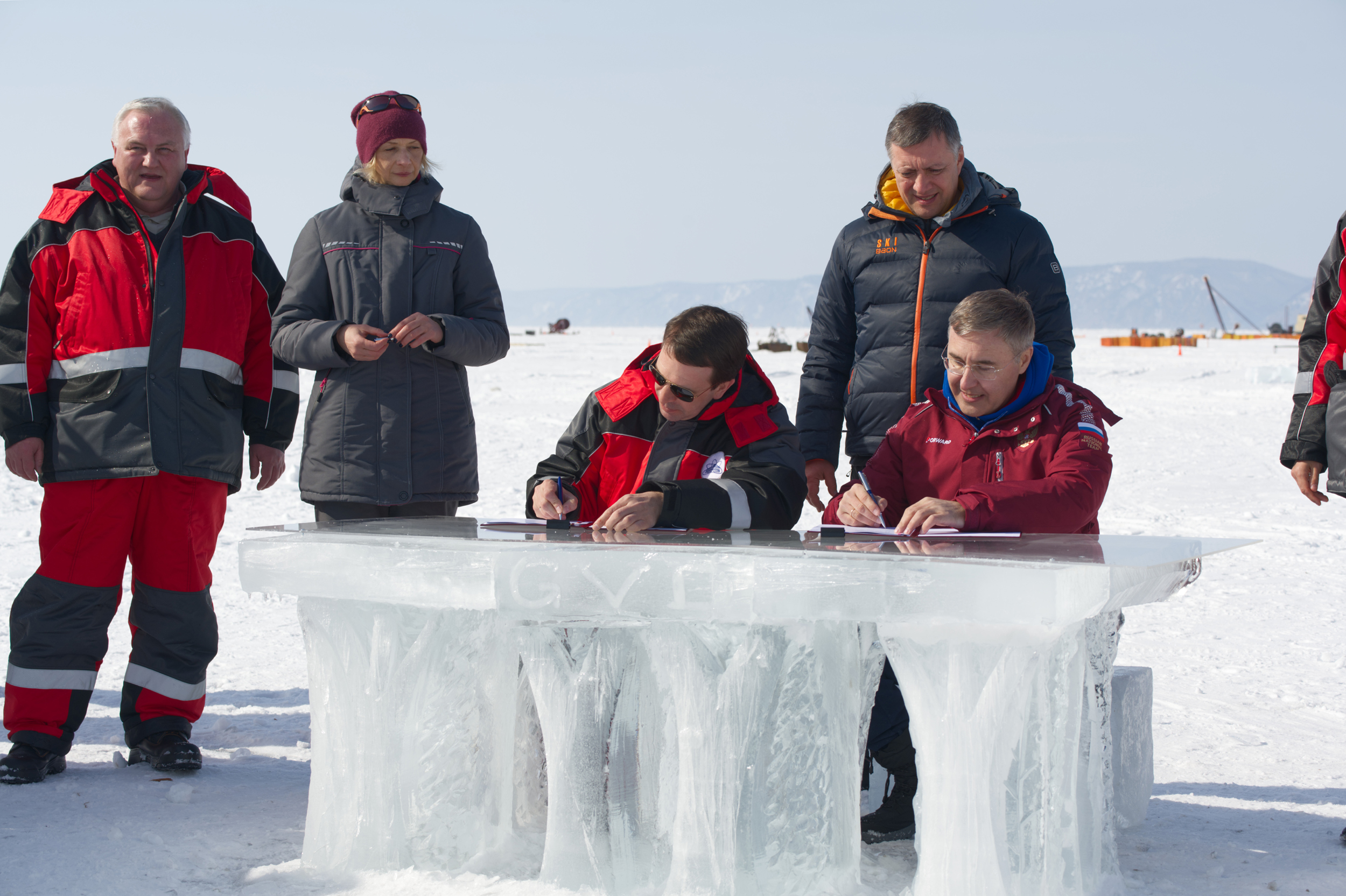Regular Baikal expedition completed
News, 03 May 2021
The annual expedition to construct the BAIKAL-GVD Deep Underwater Neutrino Telescope of a cubic-kilometre scale has been completed.
From 17 February to 4 April 2021, the eighth cluster of the telescope was installed. The effective volume of the facility increased up to 0.4 cubic km. On 13 March 2021, the detector was officially launched, and the Memorandum of Understanding was signed between the Ministry of Science and Higher Education of the Russian Federation and the Joint Institute for Nuclear Research (JINR) on development of the BAIKAL-GVD neutrino telescope.
 Winter expedition team 2021 and distinguished guests
Winter expedition team 2021 and distinguished guests
Nowadays, neutrino telescopes are important instruments of multi-messenger astronomy providing a new powerful method for exploring the Universe. BAIKAL-GVD is one of four such installations in the world. The other three are IceCube at the South Pole, KM3NeT and ANTARES in the Mediterranean Sea. All of them make up the Global Neutrino Network (GNN) aimed at expertise exchange, cooperative data processing and better general sensitivity due to different locations across the globe.
Neutrino telescopes are intended to investigate the most powerful natural accelerators emitting ultra-high-energy neutrinos, such as Active Galactic Nuclei, promising but not the only candidates. The corresponding research should help to understand the evolution of galaxies, formation of supermassive black holes and mechanisms of particle acceleration.
About cubic-kilometre scale neutrino detectors should be sensitive to tiny neutrino fluxes from the very distant objects. In 2021, BAIKAL-GVD, the largest neutrino telescope in the Northern Hemisphere, is successfully taking data with an effective volume of 0.4 cubic km. In 2027, BAIKAL-GVD is expected to observe showering neutrino interactions with a volume of 1 cubic km.
On 13 March 2021, BAIKAL-GVD was officially inaugurated. Valery Falkov, the Minister of Science and Higher Education of the Russian Federation, and Grigory Trubnikov, the Director of JINR, signed the Memorandum of Understanding between the Ministry of Science and Higher Education of the Russian Federation and JINR.
 Minister of Science and Higher Education Valery Falkov and JINR Director Grigory Trubnikov signing the Memorandum of Understanding between the Ministry and JINR. The ceremony was attended by INR Director Maxim Libanov (left) and Governor of the Irkutsk Region Igor Kobzev (right)
Minister of Science and Higher Education Valery Falkov and JINR Director Grigory Trubnikov signing the Memorandum of Understanding between the Ministry and JINR. The ceremony was attended by INR Director Maxim Libanov (left) and Governor of the Irkutsk Region Igor Kobzev (right)
The ceremony took place on the ice just above the neutrino telescope at the special ice table created by a local Siberian artist. Maxim Libanov, the Director of the Institute for Nuclear Research of the Russian Academy of Sciences (INR, RAS), welcomed distinguished guests and talked about the history, current status and development plans of the Baikal Neutrino Telescope.
The Minister officially launched the detector pressing the start-data-taking button. This event was widely covered by the mass media (for details follow this link). The BAIKAL-GVD neutrino telescope was inaugurated within the Year of Science and Technology in the Russian Federation.
The International Scientific BAIKAL-GVD Collaboration comprises the Institute for Nuclear Research of the Russian Academy of Sciences (Moscow), the Joint Institute for Nuclear Research (Dubna), Irkutsk State University, Skobeltsyn Institute for Nuclear Physics MSU (Moscow), Nizhny Novgorod State Technical University, St. Petersburg State Marine Technical University, the Institute of Experimental and Applied Physics of Czech Technical University in Prague, the Faculty of Mathematics, Physics and Informatics of the Comenius University in Bratislava (Slovakia), the Institute of Nuclear Physics of the Polish Academy of Sciences (Krakow, Poland) and EvoLogics GmbH (Berlin, Germany).
The 2021 expedition was organized by the Institute for Nuclear Research of the Russian Academy of Sciences (Moscow) and the Joint Institute for Nuclear Research (Dubna).
G.V. Domogatsky (INR, RAS),
spokesperson of the BAIKAL-GVD Collaboration
Credits: Bair Shaybonov (Dzhelepov Laboratory of Nuclear Problems, JINR)
The Dzhelepov Laboratory of Nuclear Problems of the Joint Institute for Nuclear Research has made an educational film, celebrating the 65th JINR anniversary, about the Baikal Neutrino Telescope, “The Universe through the Neutrino Telescope”. Minister Valery Falkov, JINR Director Grigory Trubnikov, INR Director Maxim Libanov, members of the BAIKAL-GVD Collaboration and others were involved in the film.
div class=”Video”>Educational film “The Universe through the Neutrino Telescope”Дополнительная информация:
Mass media about the launch of the neutrino telescope
Series of educational videos “Neutrino Hunters”
Photographs of the telescope launch and the Memorandum signing
Media Relations:
Elena Dubovik, Head of the Group of Scientific Communications DLNP JINR,
+7 (916) 336-74-79,
dubovik@jinr.ru
budubkina@gmail.com